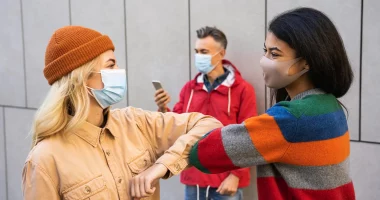Bronchitis is a condition that affects your breathing. It can make you cough a lot, wheeze (which means you make a whistling sound when you breathe), and find it hard to catch your breath. When you have bronchitis, the tubes that carry air in and out of your lungs, called bronchial tubes, get swollen and inflamed. This makes it difficult to clear out thick mucus or phlegm from your airways.
There are two types of bronchitis: acute and chronic. Acute bronchitis normally goes away on its own after a while, but chronic bronchitis sticks around and doesn’t completely disappear. Quitting smoking or avoiding smoking altogether can help stop bronchitis because smoking can make it more likely to happen.
This article will explore what causes bronchitis, its symptoms, how it’s treated, and what you can do to prevent it.
Symptoms
Both acute and chronic bronchitis have similar signs and symptoms:
- Persistent Cough: You might have a cough that won’t go away. It could create mucus, which is sometimes called phlegm.
- Wheezing: When you breathe, you might make a whistling or rattling sound.
- Low Fever and Chills: You might feel a little warmer than usual and sometimes get chills, which are like shivers.
- Chest tightness: Your chest might feel tight or uncomfortable.
- Sore Throat: Your throat might hurt or feel scratchy.
- Body Pains: You might feel achy like you do when you have the flu.
- Breathlessness: It might be harder to catch your breath, especially when you’re active.
- Headaches: You might get headaches, which are like pains in your head.
- Sinuses and Blocked Nose: Your nose might feel stuffy, and your sinuses (the spaces in your face) might feel blocked.
If you have bronchitis, your cough might last for many weeks or even months until your bronchial tubes heal completely.
For people with chronic bronchitis, symptoms can come back regularly. This frequently occurs more in the winter season.
Remember, though, that bronchitis isn’t the only thing that can make you cough. Pneumonia, Asthma, and many other conditions can cause a persistent cough. If your cough won’t go away, it’s a good idea to see a doctor to find out what’s causing it.
When to Consult a Doctor
Many people can get better from bronchitis by resting, taking anti-inflammatory medicines, and drinking lots of fluids.
However, it’s important to see a healthcare professional if you have:
- Cough has persisted for over three weeks
- Fever lasting three days or more
- Presence of blood in the mucus
- Rapid breathing and chest pains
- Extreme fatigue or confusion
- Symptoms recurring or worsening
If you already have a heart or lung condition and you start to have signs of bronchitis, it’s especially important to see a healthcare professional. They can help you manage your symptoms and prevent any complications.
Diagnosis
To diagnose bronchitis, a healthcare professional will start by examining you. They’ll use a stethoscope to listen to your lungs for any unusual sounds.
They might also ask you questions about:
- Your symptoms, especially your cough
- Your medical history, including any past health issues
- If you’ve had a recent flu or cold
- Whether you smoke or are around people who smoke
- If you’re exposed to things like fumes, dust, or air pollution
In addition to the physical exam and questions, the doctor might:
- Take a sample of your mucus (sputum swab) to examine for viruses or bacteria in a lab
- Inspect the oxygen levels in your blood
- Suggest a chest X-ray to get a clearer picture of your lungs
- Suggest a pulmonary lung working test to see how well your lungs are working
- Perform blood tests to check for any signs of infection or other health issues
Treatment
When you have acute bronchitis, antibiotics usually won’t help, so healthcare providers usually don’t prescribe them. Instead, they might suggest some things you can do to help yourself feel better:
Natural Remedies
These are things you can try at home to feel better. For example:
- Using honey in hot water or tea can soothe your cough.
- Utilizing a humidifier can make it easier to breathe by loosening up the mucus and reducing wheezing.
- Resting and drinking plenty of fluids can help your body fight off the infection.
- Doing some gentle exercises can strengthen your chest muscles and make breathing easier.
- Learning better breathing techniques across pulmonary rehabilitation can improve your lung function.
- Quitting smoking or avoiding other lung irritants can help your lungs heal.
Medications
Over-the-counter medicines like ibuprofen can help relieve your cough and any pain you might have. Acute bronchitis often gets better on its own without needing any treatment.
- Cough Medicine: Sometimes, cough medicine can help you feel better, especially at night when coughing might disturb your sleep.
- Bronchodilators: These medicines can open up your airways and help clear out the mucus.
- Mucolytics: These medicines can make the mucus in your airways thinner, so it’s easier to cough up.
- Steroid Drugs and Anti-inflammatory: These medicines can help decrease inflammation in your airways and prevent tissue damage.
If you have chronic bronchitis, your symptoms might get better for a while, but they’ll likely come back or get worse, especially if you’re around some other triggers.
Sometimes, if acute bronchitis is caused by bacteria, a doctor might recommend antibiotics. Antibiotics can also help stop a secondary infection in few cases. But antibiotics won’t help if your bronchitis is caused by a virus.
Doctors try to avoid prescribing antibiotics except they’re sure bacteria are causing the illness. This is because using antibiotics too much can make them less effective in the future, which is a problem called antibiotic resistance.
Complications
The main problem that can happen with bronchitis is pneumonia. This occurs when the infection moves deeper into the lungs. When someone has pneumonia, fluid fills up the tiny air sacs in the lungs.
Pneumonia is more common in old-aged adults, people who smoke, those with other health problems, and anyone with a weak immune system. It can be very serious and requires medical help.
Prevention
You can’t always stop acute or chronic bronchitis from happening, but there are things you can do to lower your chances:
- Quit Smoking or Avoid Smoking: Smoking is a big cause of bronchitis, so if you smoke, stopping can help prevent it. Also, try to stay away from places where people smoke.
- Avoiding Things That Irritate Your Lungs: Stay away from things that can bother your lungs, like fumes, smoke, vapors, dust, and air pollution.
- Wear a Mask When Pollution is High: If the air outside is very polluted, wearing a mask that covers your nose and mouth can help protect your lungs.
- Wash Your Hands Often: Washing your hands regularly can help you avoid getting sick from bacteria and germs.
- Vaccinations: Vaccinations can protect you from getting sick with the flu and pneumonia, which can lead to bronchitis. So, ask your doctor about getting vaccinated.’









